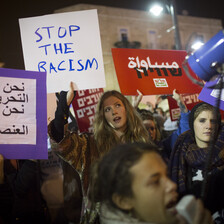The Electronic Intifada 25 September 2009
A local authority in Israel has announced that it is establishing a special team of youth counsellors and psychologists whose job it will be to identify young Jewish women who are dating Arab men and “rescue” them.
The move by the municipality of Petah Tikva, a city close to Tel Aviv, is the latest in a series of separate — and little discussed — initiatives from official bodies, rabbis, private organizations and groups of Israeli residents to try to prevent interracial dating and marriage.
In a related development, the Israeli media reported this month that residents of Pisgat Zeev, a large Jewish settlement in the midst of Palestinian neighborhoods in East Jerusalem, had formed a vigilante-style patrol to stop Arab men from mixing with local Jewish girls.
Hostility to intimate relationships developing across Israel’s ethnic divide is shared by many Israeli Jews, who regard such behavior as a threat to the state’s Jewishness. One of the few polls on the subject, in 2007, found that more than half of Israeli Jews believed intermarriage should be equated with “national treason.”
Since the state’s founding in 1948, analysts have noted, a series of legal and administrative measures have been taken by Israel to limit the possibilities of close links developing between Jewish and Arab citizens, the latter comprising a fifth of the population.
Largely segregated communities and separate education systems mean that there are few opportunities for young Arabs and Jews to become familiarized with each other. Even in the handful of “mixed cities,” Arab residents are usually confined to separate neighborhoods.
In addition, civil marriage is banned in Israel, meaning that in the small number of cases where Jews and Arabs want to wed, they can do so only by leaving the country for a ceremony abroad. The marriage is recognized on the couple’s return.
Yuval Yonay, a sociologist at Haifa University, said the number of interracial marriages was “too small to be studied.” “Separation between Jews and Arabs is so ingrained in Israeli society, it is surprising that anyone manages to escape these central controls.”
The team in Petah Tikva, a Jewish city of 200,000 residents, was created in direct response to news that two Jewish girls, aged 17 and 19, were accompanying a group of young Arab men when they allegedly beat a Jewish man, Leonard Karp, to death last month on a Tel Aviv beach. The older girl was from Petah Tikva.
The girls’ involvement with the Arab youths has revived general concern that a once-firm taboo against interracial dating is beginning to erode among some young people.
In sentiments widely shared, Hezi Hakak, a spokesman for Petah Tikva municipality, said “Russian girls” — young Jewish women whose parents arrived in Israel over the past two decades, since the collapse of the former Soviet Union — were particularly vulnerable to the attention of Arab men.
Dr. Yonay said Russian women were less closed to the idea of relationships with Arab men because they “did not undergo the religious and Zionist education” to which more established Israeli Jews were subject.
Hakak said the municipality had created a hotline that parents and friends of the Jewish women could use to inform on them.
“We can’t tell the girls what to do but we can send a psychologist to their home to offer them and their parents advice,” he said.
Motti Zaft, the deputy mayor, told the Ynet website that the municipality was also cracking down on city homeowners who illegally subdivide apartments to rent them cheaply to single Arab men looking for work in the Tel Aviv area. He estimated that several hundred Arab men had moved into the city as a result.
Petah Tikva’s hostility to Arab men mixing with local Jewish women is shared by other communities.
In Pisgat Zeev, a settlement of 40,000 Jews, some 35 Jewish men are reported to belong to a patrol known as “Fire for Judaism” that tries to stop interracial dating.
One member, who identified himself as Moshe to The Jerusalem Post newspaper, said: “Our goal is to be in contact with these girls and try to explain to them the dangers of what they’re getting themselves into. In the last 10 years, 60 girls from Pisgat Zeev have gone into [Palestinian] villages [in the West Bank]. And most of them aren’t heard from after that.”
He denied that violence or threats were used against Arab men.
Last year, the municipality of Kiryat Gat, a town of 50,000 Jews in southern Israel, launched a program in schools to warn Jewish girls of the dangers of dating local Bedouin men. The girls were shown a video titled Sleeping with the Enemy, which describes mixed couples as an “unnatural phenomenon.”
Haim Shalom, head of the municipality’s welfare department, is filmed saying: “The girls, in their innocence, go with the exploitative Arab.” A police representative also warns that the Bedouin men’s “goal is to take advantage of the girls. There is no element of love or an innocent friendly relationship here.”
In 2004, posters sprang up all over the northern town of Safed warning Jewish women that dating Arab men would lead to “beatings, hard drugs, prostitution and crime.”
Safed’s chief rabbi, Shmuel Eliyahu, told a local newspaper that the “seducing” of Jewish girls was “another form of war” by Arab men.
Both Kiryat Gat and Safed’s campaigns were supported by a religious organization called Yad L’achim, which runs an anti-assimilation team publicly dedicated to “saving” Jewish women.
According to its website, the organization receives more than 100 calls a month about Jewish women living with Arab men, both in Israel and the West Bank. It launches “military-like rescues [of the women] from hostile Arab villages” in coordination with the police and army.
“The Jewish soul is a precious, all-too-rare resource, and we are not prepared to give up on even a single one,” says the website.
Yad L’achim’s founder, Rabbi Shlomo Dov Lifschitz, is quoted on the site saying: “People must understand that Jewish-Arab marriages are part of the larger Israeli-Arab conflict. … They [Arab men] see it as their goal to marry them [Jewish women] and ensure that their children aren’t raised as Jews. This is their revenge against the Jewish people. They feel that if they can’t defeat us in war, they can wipe us out this way.”
The degree of general opposition in Israel to interracial marriage was suggested by a government-backed television ad campaign earlier this month that urged Israeli Jews to inform on relatives abroad who were in danger of marrying a non-Jew. The ads were hastily withdrawn by surprised Israeli officials after many US Jews took offense.
In her book Birthing the Nation, Rhoda Kanaaneh, a Middle East scholar at New York University, points out that “politicians frequently attack ‘peace’ or ‘dialogue’ programs for promoting miscegenation” in fear that it will lead to Jewish assimilation.
She also notes that Israel’s adoption and surrogacy laws require that adoptive parents be of the same ethnic group as the biological mother.
Jonathan Cook is a writer and journalist based in Nazareth, Israel. His latest books are Israel and the Clash of Civilisations: Iraq, Iran and the Plan to Remake the Middle East (Pluto Press) and Disappearing Palestine: Israel’s Experiments in Human Despair (Zed Books). His website is www.jkcook.net.
A version of this article originally appeared in The National, published in Abu Dhabi.





